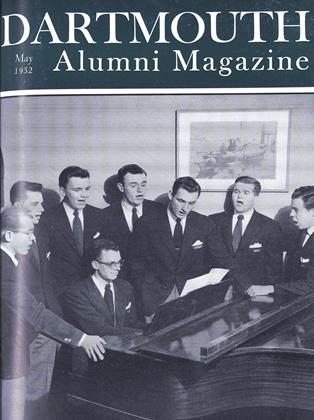Vol, 23, No. 6,The Reference Shelf, Edited by Herbert L.Marx Jr. 43. H. W. Wilson; 222 pp.; $1.75.
Editor Marx states that his plan is to portray the pattern of gambling in the United States and to present some contrasting points of view. The first three sections of this compilation are devoted to the many varieties of gambling prevalent today. The fourth section discusses buying and selling in commodities and securities as a form of gambling. The final sections, devoted to legalization of gambling and to the moral aspects, range in selections from "The Curse of Chance," from Chaucer's Pardoner's Tale to excerpts from the Kefauver Committee reports.
The editorial preface points up the gulf between 1) legal policy and moral guidance and 2) compliance with this policy and guidance. Not only are feelings about gambling mixed within the individual but these reactions are transferred to the group. The articles support the contention that "There are no sharp distinctions between right and wrong, or between a wise and moral course of action and a foolish and evil one." So, for example, we have the mayor of Las Vegas, Nevada, saying that .. chance is a factor in life ... that Queen Elizabeth [she of the 16th century] long ago discovered that adults 'secretly or openly ... do commonly play' and 'no penalty of the law or statutes' stopped them. She thought the government might as well benefit. And so do we." [And so Queen Elizabeth gave a patent for gaming houses in spite of a strict law against it.] Not so feels Thomas Dewey, Governor of New York, whose answer to William O'Dwyer's proposal for legal betting on public sports events, represents the opposite, strictly moral, point of view.
One would wish that this volume of the Reference Shelf were circulated far and wide to point out, as the editor notes, "the desirability of selecting a more consistent national or community policy than has been in operation in the past."
 View Full Issue
View Full Issue
More From This Issue
-
 Class Notes
Class Notes1918
May 1952 By ERNEST H. EARLEY, DONALD L. BARR, RICHARD A. HOLTON -
 Class Notes
Class Notes1929
May 1952 By F. WILLIAM ANDRES, EDWIN C. CHINLUND, GEORGE B. REDDING -
 Article
ArticleAshurnazirpal's Story
May 1952 By DONALD P. HANSEN '53 -
 Class Notes
Class Notes1917
May 1952 By KARL W. KOENIGER, DONALD BROOKS, HOWARD A. STOCKWELL -
 Article
Article25 Years After
May 1952 By JAMES D. BINDER '52 AND THOMAS L. PAPST '52 -
 Article
ArticleThe Undergraduate Year
May 1952 By KENNETH J. ROMAN JR. '52
Books
-
 Books
BooksThe latest musical composition
MARCH 1932 -
 Books
BooksAlumni Articles
MAY 1969 -
 Books
BooksTHE NEW WORLD, 1939/1946.
OCTOBER 1962 By Frank Smallwood ’51 -
 Books
BooksSAMUEL BECKETT: POET AND CRITIC.
FEBRUARY 1971 By J. D. O'HARA '53 -
 Books
BooksCITIZENSHIP AND CIVIC AFFAIRS,
May 1940 By Louis P. Benezet '99 -
 Books
BooksTOLSTOY
JANUARY 1929 By Stearns Morse


